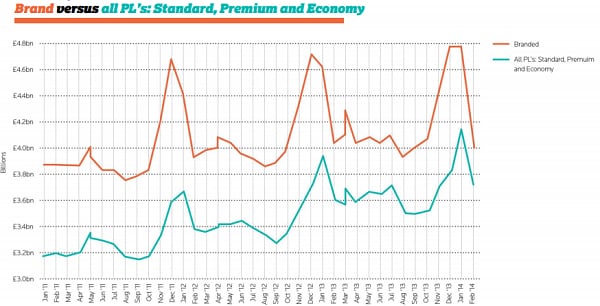While many expected consumers to buy less expensive products and trade down to private label products during a recession where food inflation is higher than real disposable income, the new Kantar Worldpanel figures show that consumer preference for private label and less expensive products is a trend that is continuing and may be here to stay.
The data, commissioned by MSLGROUP London, shows that between 2011 and 2013, private label (PL) sales have risen 1.32% at a total grocery level. This trend continued into the first two months of 2014, with PL sales accounting for 46.49% of total grocery sales in January and 48.06% for February, and up by 0.88% compared to the same period in 2013.
With increasing competition among retailers for consumers to spend, private label is set to become the new battleground.
“For supermarkets, private label (PL) and the higher margins they achieve are a much needed antidote to the challenging environment," explained Adrian Atterby, director, Kantar Worldpanel. "So significant is the move to private label that in some retailers, in some categories, branded products have disappeared from the shelves completely."

Innovation cut
The falling fortunes of many brands has been linked to limited R&D and product innovation during the economic downturn - with just half of all new products surviving two years on the shelves and an average product lifespan of four to five years, according to Kantar Worldpanel.
"In order for brands to remain successful and to warrant a place on shelf they must demonstrate a clear USP and one that isn’t easily copied by PL products. The need to continually innovate is paramount for branded products,” said Atterby.
Mallika Basu, director at MSLGROUP London, added that whileretailers are becoming more conscious about the value of their shelf space, and consumers are savvier than ever before, "innovation still represents a significant opportunity for brands."
"As category leaders, they have the vision and expertise to drive new opportunity through innovation," she said. "In economic recovery, innovation that challenges category norms by being story-led, rather than product led, is likely to pay an increasingly important role."
"To be successful, product innovation and story innovation must go hand in hand.”
